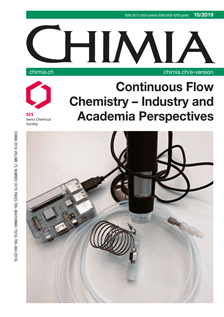Fouling of Flow Reactors in Organolithium Mediated Transformations: Experience on Scale-up and Proposed Solution
DOI:
https://doi.org/10.2533/chimia.2019.809PMID:
31645241Keywords:
Avoid clogging, Continuous manufacturing, Flow chemistry, Fouling, Organolithium reagentsAbstract
Continuous processing has been demonstrated to be a superior approach when applied to fast and energetic chemical transformations. Indeed, whereas classical batch or semi-batch methods require cryogenic conditions and slow addition rates of reactive species, flow technologies enable rapid mixing of synthetic partners in a highly controlled environment. As a result, low yielding and dangerous processes in batch can be performed at scale in a cost competitive and safer continuous manner. Despite the advantages of higher quality and safety, the perennial problems of solids build-up and pipe fouling threaten the robustness and reliability of flow processes. In this contribution, a new methodology to prevent reactor fouling is reported and discussed. The implementation of this methodology has been decisive in solving fouling issues encountered during the piloting of an organolithium based flow process.Downloads
Published
2019-10-30
Issue
Section
Scientific Articles
License
Copyright (c) 2019 Swiss Chemical Society

This work is licensed under a Creative Commons Attribution-NonCommercial 4.0 International License.
How to Cite
[1]
P. Filipponi, F. Venturoni, R. Suremann, A. Streit, S. Schoenebeck, B. Schenkel, J. Polenk, L. Piccioni, R. O'Meadhra, S. Mostarda, J. Haber, B. Guelat, S. Wegmann, Chimia 2019, 73, 809, DOI: 10.2533/chimia.2019.809.







